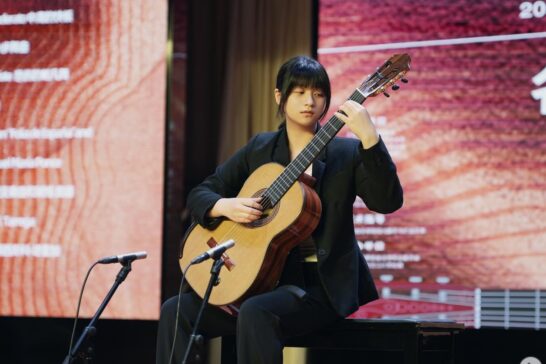Curtis Students Channel Heartrending Emotion in Monteverdi's L'Orfeo

In the world of opera, Claudio Monteverdi’s L’Orfeo is revered for its enduring emotional power. Premiered in 1607, the work was the first of its kind to emotionally shape music through text, moving beyond the speech-like, recitative style of early opera.
The opera’s storyline is intrinsically intense. Based on the tragic Greek myth, L’Orfeo follows young Orpheus’ decent into Hades to resurrect his dead wife Euridice. When he fails, Orpheus is forced to face the biggest challenge of all: Reckoning with our own mortality.
On Friday, November 14, and Sunday, November 16, Curtis Opera Theatre channels that same emotional intensity into its new staging of L’Orfeo, presented at the Philadelphia Film Center’s Mainstage Theater. Conceived by director, playwright, and educator John Matsumoto Giampietro and led by conductor David Stern, the production features a curated cast of rising young opera artists.
Below, two current Curtis students and L’Orfeo cast members—Juliet Renée Rand as Euridice and Henry Drangel as Pastore II—delve deeper into the opera’s emotional core. Read on for their reflections on what makes L’Orfeo so moving—and an inside look at their creative process.
L’Orfeo is praised for using music to heighten emotion and storytelling in ways that were novel at the time. What moments have struck you as especially powerful?
Juliet Renée Rand: For this production, Mr. Giampietro added a duet for Euridice and Proserpina to help give Euridice more of a voice. So much of what she sings is just a response to Orfeo. This madrigal gives her a voice of her own, allowing her to finally express her sadness and pain. She becomes a real person—not just something beautiful to look at.
Henry Drangel: Following his first entrance, Orfeo sings the aria “Rosa del ciel,” and I think it’s the most beautiful and moving thing. It embodies how, in this opera, emotion is shaped through musical and physical gestures. In a way, there’s no such thing as emotion: The performer’s goal is to feel these gestures inside of oneself, then express them externally.
Why do you think this opera still resonates so strongly with audiences today?
There’s something so honest and pure about this story. I think a lot of people can relate to some sort of loss. Seeing others cope in real time through this beautiful love story and music can really touch people. It’s also the simplicity of it: Anyone who has experienced grief can understand the gravity of it. —Juliet Renée Rand
Was there an aspect of L’Orfeo that surprised you? For an audience member first experiencing it, what would you encourage them to listen for?
Drangel: Every word in L’Orfeo carries weight. Monteverdi built his music directly from the text so the words lead the notes—every phrase is shaped by the story’s emotion and meaning. You can think of it like reciting Shakespeare, but through music and singing. There’s also a sort of domino effect: Every phrase leads to another full-circle moment in the story.
At Curtis, we believe in learning-by-doing, encouraging our students to prioritize experiences that help them grow. How has this been reflected in your experience so far, both on and off the stage?
Drangel: I’ve improved and built confidence simply from the act of doing. Just like anything in life, you have to keep repeating something before it becomes natural. I think about it like mountains: As soon as you’ve climbed a higher one, you’ll have more challenges to face to get to the next level. I try to remind myself that I just have to keep at it.
Rand: That’s what’s so special about Curtis. We have so many performance opportunities. This opera, for example, gives us first-hand experience with an early music style. And we have the opportunity to learn it in a safe school environment. So going forward, if we undertake anything similar, we’ve already developed meaningful tools we can use.
Catch Rand and Drangel in Curtis Opera Theatre’s upcoming production of “L’Orfeo” on November 14 and 16. Both performances are currently sold out, but register for the waitlist, and we’ll notify you when tickets are available.


